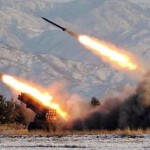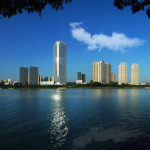- DETERRENCE: Can a Sino-Japanese war be controlled?
- DPRK: China offers economic incentives in exchange for S. Korea rejecting THAAD: report
- GOVERNANCE AND CIVIL SOCIETY: Behind masks, guerilla-style groups scattering leaflets critical of Pres. Park
- CLIMATE CHANGE ADAPTATION: Climate-related flood risks and urban responses in the Pearl River Delta
- AUSTRAL PEACE AND SECURITY: It pains me to say it, but Abbott has learned nothing about Iraq
 DETERRENCE: Can a Sino-Japanese war be controlled? R. Ayson, D. Ball, Survival: Global Politics and Strategy, vol. 56, no.6, 135-166 (2014) *Subscription only
DETERRENCE: Can a Sino-Japanese war be controlled? R. Ayson, D. Ball, Survival: Global Politics and Strategy, vol. 56, no.6, 135-166 (2014) *Subscription only
Ayson and Ball consider whether a China-Japan conflict is controllable; how the US might be involved; and the risk that China or the US might use nuclear weapons. They suggest that C4ISR vulnerability may encourage early escalation via overconfidence, fear of pre-emption, co-location conventional and nuclear forces, lack of hotlines.
- Nuclear command-and-control in the Millenials era, Peter Hayes, NAPSNet Special Reports, Nautilus Institute (17 February 2015)
- The tools of Owatasumi, Japan’s ocean surveillance and coastal defence capabilities, Desmond Ball, Richard Tanter, ANU Press (January 2015)
 DPRK: China offers economic incentives in exchange for S. Korea rejecting THAAD: report, Global Post (9 March 2015)
DPRK: China offers economic incentives in exchange for S. Korea rejecting THAAD: report, Global Post (9 March 2015)
China’s offer of economic incentives to not participate in THAAD (Theater High Altitude Air Defense) indicates they do not perceive North Korea’s missile programs and/or proliferation as a major concern. The offer also reinforces the signal that China intends to deal with North Korea as an issue that is less important relative to South Korea. The United Nations Panel of Experts released its latest report. China’s tepid statements on a possible meeting between Kim and senior Chinese leadership were likely meant for Western media rather than a perceived demand signal from China’s public or North Korea’s leaders.
- Final report of the Panel of Experts submitted pursuant to resolution 1874 (2014), United National Panel of Experts on North Korea (23 February 2015) [PDF, 20.9 MB]
- China says North Korean leader meeting to happen when ‘convenient’, Michael Martina and Ben Blanchard, Reuters News Service (7 March 2015)
 GOVERNANCE AND CIVIL SOCIETY: Behind masks, guerilla-style groups scattering leaflets critical of Pres. Park, Park Ki-yong, Hankyoreh (3 March 2015)
GOVERNANCE AND CIVIL SOCIETY: Behind masks, guerilla-style groups scattering leaflets critical of Pres. Park, Park Ki-yong, Hankyoreh (3 March 2015)
Unknown groups have been distributing leaflets critical of the Park Administration from the tops of buildings in Seoul, with members wearing masks to avoid prosecution. Some fear that freedom of speech to criticize the president is under attack, with artists being charged for defamation as well as a Japanese journalist’s upcoming trial.
- Police look into anti-Park leaflets, Kim Se-jeong, Korea Times (27 February 2015)
- Political satire under threat, Korea Herald (27 February 2015)
- Korean court rejects Sankei journalist’s petition to lift travel ban, Kyodo (13 February 2015)
 CLIMATE CHANGE ADAPTATION: Climate-related flood risks and urban responses in the Pearl River Delta, China, Liang Yang, Jürgen Scheffran, Huapeng Qin and Qinglong You, Research Group Climate Change and Security, University of Hamburg (2015) [0.98 MB, PDF]
CLIMATE CHANGE ADAPTATION: Climate-related flood risks and urban responses in the Pearl River Delta, China, Liang Yang, Jürgen Scheffran, Huapeng Qin and Qinglong You, Research Group Climate Change and Security, University of Hamburg (2015) [0.98 MB, PDF]
The evaluation of flood vulnerabilities in the PRD (Pearl River Delta) cities indicates a complicated situation. Low lying locations with great human welfare and vital infrastructure contribute to the high exposure of these cities, in particular of central cities like Hong Kong, Shenzhen and Guangzhou. These cities also lead the sensitivity ranking, which indicates that vulnerable sections of society (e.g. old people, unemployed labor, small business) are the core concern in addressing flood threats. Fortunately, even though the exposure and sensitivity indicators are significant in the most developed cities, flood risks and potential damages can be mitigated greatly by improving both hard and soft flood-control measures.
- Regional flood frequency and spatial patterns analysis in the Pearl River Delta Region using L-moments approach, Tao Yang, Chong-Yu Xu, Quan-Xi Shao and Xi Chen, Stoch Environ Res Risk Assess, vol. 24, pp. 165–182 (2010) [1-46 MB, PDF]
- Temporal and spatial variability of annual extreme water level in the Pearl River Delta Region, China, Wei Zhang et al., Global and Planetary Change, Vol. 69, pp. 35–47 (2009) [870 KB, PDF]
 AUSTRALIAN PEACE AND SECURITY: It pains me to say it, but Abbott has learned nothing about Iraq, Tom Switzer, The Guardian (3 March 2015)
AUSTRALIAN PEACE AND SECURITY: It pains me to say it, but Abbott has learned nothing about Iraq, Tom Switzer, The Guardian (3 March 2015)
As Australia despatches another 300 troops to fight the ISIS “death cult”, neither strategic direction nor rationale are clear. Cordesman: “Talking about ‘boots on the ground’ in Iraq and Syria out of this far broader strategic context is all mouth and no mind.” Switzer: “We should keep out of this mess and let the rival Sunni and Shia groups settle their differences. Our experience in Iraq shows western powers are incapable of creating a durable peace.”
- Boots on the ground: the realities in Afghanistan, Iraq, and Syria, Anthony H. Cordesman, CSIS (13 February 2015)
- Australia key to coalition role in war against Islamic State in Iraq, David Kilcullen, The Australian (7 March 2015) * Subscription only
- ISIS sanctuary, Jessica Lewis McFate, Institute for the Study of War Iraq Updates (4 March 2015)
The Nautilus Peace and Security Weekly Report presents articles and full length reports each week in six categories: Austral security, nuclear deterrence, energy security, climate change and security, the DPRK, climate change adaptation and governance and civil society. Our team of contributors carefully select items that highlight the links between these themes and the three regions in which our offices are found — North America, Northeast Asia, and the Austral-Asia region.
Subscribe to NAPSNet to receive free weekly email reports.
- Editor: Arabella Imhoff
Contributors:
- Deterrence: Peter Hayes
- DPRK: Roger Cavazos
- Governance and Civil Society: Dyana Mardon
- Climate Change Adaptation: Saleem Janjua
- Climate Change and Security: Richard Tanter

